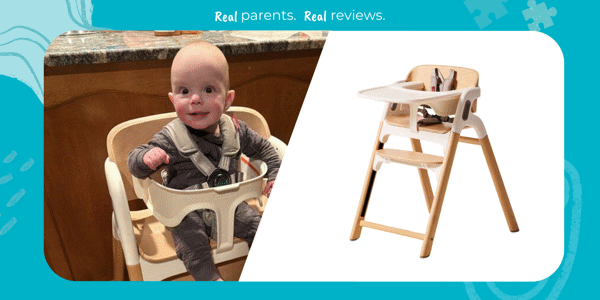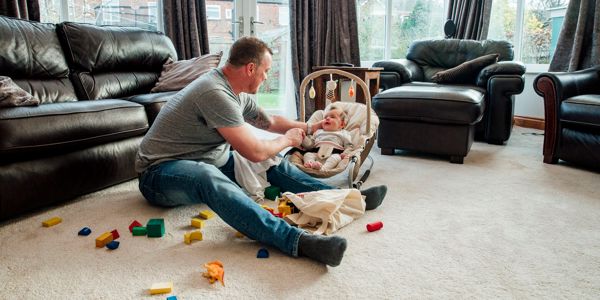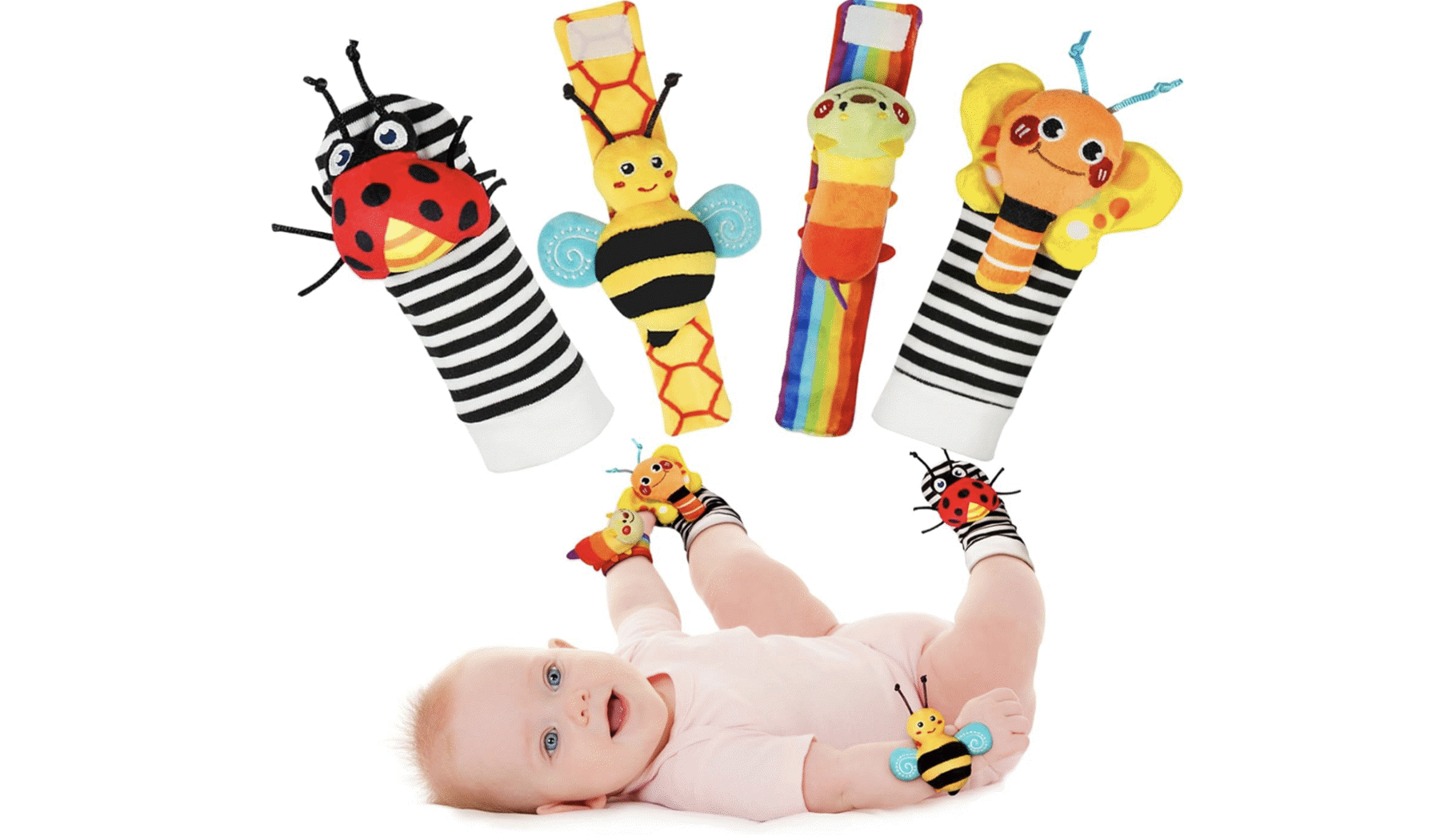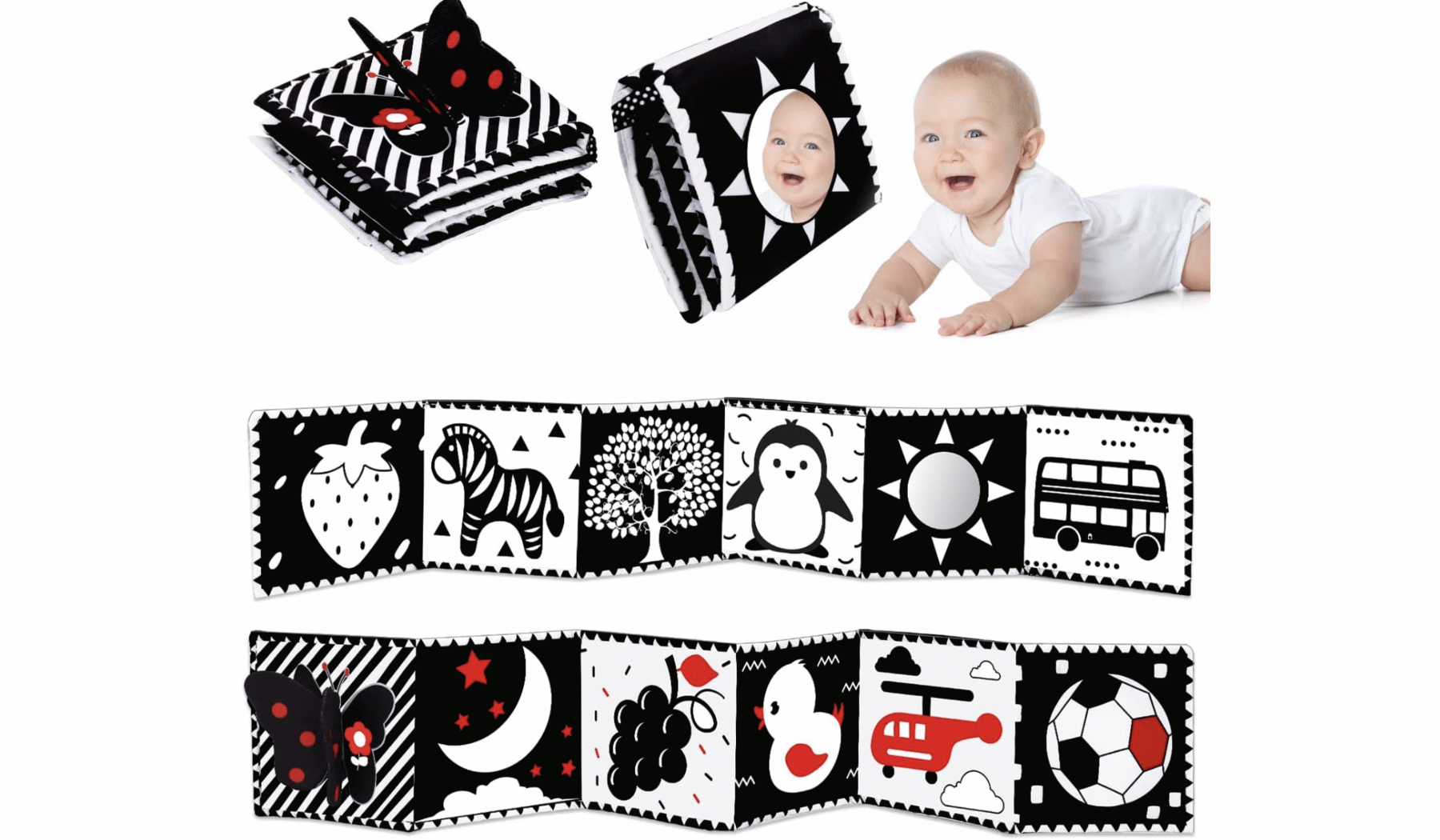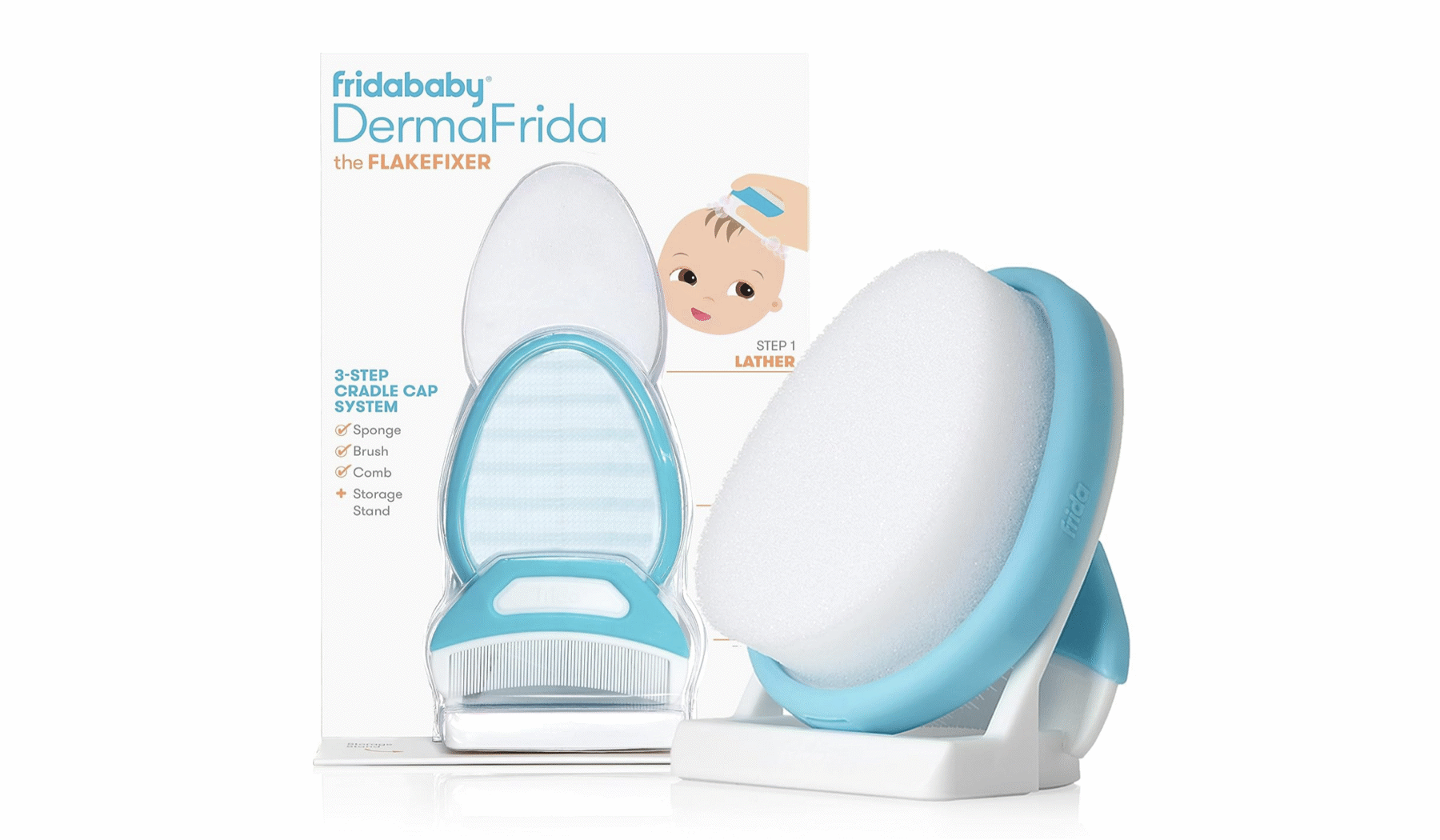Welcome to month four of your baby's life! Each week, your baby grows and changes, melting your heart and bringing you smiles (and possibly tears!). Whether it's sleepless nights, challenges with breastfeeding, or "stranger danger" anxiety, we've got you covered.
This week is big for your baby in terms of social development! They are likely making silly faces at you and trying to mimic your expressions. You may hear them giggling more, too. When you tickle them, you will likely get a reaction (laugh) to your action (tickling). As their laughing ability develops, so will their ability to cry when they are upset or frustrated. Be sure to talk to your baby when they are upset and validate their feelings. Although they cannot speak, they will sense that you accept their feelings and emotions.
Your baby is starting to establish their own sleep-wake cycle, also known as a circadian rhythm. This means they're getting the hang of a regular sleep schedule. As part of this, you may notice that your little one is sleeping for longer stretches at night, which is a win for everyone involved! They're getting better at distinguishing between day and night.
As your baby develops, some of their features might change. You may notice a change in your baby's hair color or texture. Soft hair may turn bristly, thin hair might thicken, and straight hair can become curly. Babies born with light or even white-blonde hair often develop darker hair as they grow. Some babies might lose their hair and then grow in new locks.
Eye color is another feature that can change as your baby leaves the newborn stage. Eye color depends on melanin, a protein secreted by melanocytes that respond to light. Since your baby was in a dark womb until birth, it is very likely that their eye color will lack pigment at birth and will change as they are exposed to more light over time. Brown eyes contain the most melanin and are not likely to change.
From tracking objects with their eyes to recognizing familiar faces, your baby's visual development at this age is fantastic. One noticeable improvement during month four is your baby's distance vision. They can now recognize people across the room and focus on things that aren't right in front of them.
Your baby's color vision has also progressed to a point where they can distinguish a broader range of hues and varying colors. While they may not yet perceive colors as vividly as adults, they are learning to differentiate between primary colors such as red, blue, and yellow.
Engage your little one's blossoming color vision by exposing them to toys, books, and objects with contrasting colors. Better still, take them on walks in nature and show them the incredible colors that make up our surroundings!
It is as vital now as ever to keep your endorphins up. While it has been four months since giving birth, nourishing your body on the inside and outside is still crucial. You have learned tips for eating healthy and keeping nutritious on the inside. Still, it is also essential to keep your energy levels up! Light to moderate exercise can make you feel happier, boost brain health and memory, and keep your skin young!
There is no need to go crazy and attempt extreme weight loss; diastasis recti is still possible, so self-check your abdominal muscles before working out. Even a brisk walk around the neighborhood four times a week can provide numerous benefits to your body. If you have a buddy you can walk with, you can motivate each other.
You're likely starting to feel more like yourself again after giving birth. If you haven't already, this week can be an opportune time to take small steps toward leaving your baby with someone else for short periods. It's normal to feel a mix of emotions about this milestone.
Postpartum sweating, or night sweats refers to excessive sweating experienced by new moms in the weeks and months following childbirth. Postpartum sweating is primarily attributed to hormonal fluctuations that occur after childbirth. During pregnancy, your body retains extra fluids, which are then eliminated after delivery. This sudden decrease in fluid volume can lead to increased sweating as the body regulates itself. Wear breathable clothing and lightweight bedding to help regulate body temperature during sleep.
Your baby has been making facial expressions and experimenting with sounds for a while now. Like chit-chat copy-cat, try to get your baby to mimic expressions and actions rather than just sounds this week. Your baby's cubelli neurons (“mirror neurons”) help them observe your expressions and repeat them back to you. To help fire up these mirror neurons, you can try making several expressions and see if your baby will repeat them back. Making a game out of this is a fun activity to entertain your baby and help their development.
Try doing things like blinking slowly, opening and shutting your mouth repeatedly, smiling, clapping, holding your hand out, and seeing if your baby reciprocates.
Whether your baby's hair remains the same or changes, you must know how to care for any texture hair they develop. No matter the texture or thickness of your baby's hair, it is essential to shampoo your baby's head around twice a week to avoid cradle cap (oily, flaky patches of skin on the scalp).
For thin hair, gently combing your baby's hair should be all you need; if your baby has thicker or curly hair, comb in conditioner or baby oil once a week after shampooing to combat dryness. You can rinse it out once you comb it in gently. Remember that when rinsing your baby's scalp, you do not need to pour water over their head.Your little one is growing physically and cognitively! This week, they may even master rolling onto their back when placed on their stomach. This skill comes later since they need muscle strength and coordination to roll from one side to another. They are more comfortable moving now and using their arms, legs, and core to maneuver around. Rolling over is a significant milestone, but rolling around to different spots of the room shows their cognitive skills have developed as well! Getting from point A to point B shows that they are problem-solving and putting these skills to work.
This week is when many babies develop their own personalities. Some babies will move around more than others; some will move around even more than they talk. Other babies will talk all the time but only move around a little. Whether your baby has sped up their movements, slowed down, or remained at the same speed, there is no need for concern.
Encourage your baby to work on various skills, as they tend to focus on one area of development at a time. Your baby will master one skill at a time and move to other developmental domains when she is ready. They work hard to perfect each skill one at a time, so keep them open to a variety of skills without overwhelming them so that when they are ready to master something else, they will not be scared to try something new.
Leading up to this month, you may have noticed your baby becoming increasingly responsive to your playfulness! At this age, they are beginning to develop a sense of humor, finding joy in the fun things around them. After months of funny faces and voices without getting much back, now is the time you can act silly with your little one without it feeling so one-sided.
Tickling, peek-a-boo, and funny faces are just some things that bring some giggles from your little one. Engaging in these playful interactions encourages their sense of humor and strengthens your bond.
As your baby's vocal abilities develop, they will experiment with new sounds and vocalizations. Blowing raspberries is a classic example of these newfound verbal skills that many babies are ecstatic to discover. Blowing raspberries entertains your baby and aids in their oral and facial muscle development.
Encouraging their noises and babbling and responding to their vocalizations with excitement and interest will stimulate their language skills and facilitate further communication.
Fevers can cause concern for any parent, but they are often a sign that your baby's body is fighting an infection. If your baby is under six months old and has a temperature of 100.4°F or above, this is considered a fever and might be a sign that they're fighting off an infection. This could be a cold, the flu, or an ear infection. If your four-month-old's fever persists, speaking to your baby's pediatrician is essential.
Now that your days consist of breastfeeding, changing diapers, swaddling, and tiptoeing around your sleepy baby, you may be reminiscing on the good old days when you were the main character in your life. As a mother, your life revolves around keeping your baby healthy and ensuring they are safe. Still, to spend every day nurturing others, you must take care of yourself!
You may not be able to relax as often anymore, but focusing on yourself for a few minutes daily is vital! “Me” time can be anything that brings you joy! Simple things such as taking a few moments each day to meditate will drastically improve your feelings about life.
Meditation can be done anywhere, anytime, for however long! While you may not be able to indulge in a spa day, you can take a long hot shower when your little one is down! Self-care is so important because when you feel good, it affects how you treat and care for others. Giving yourself a foot rub with lotion before bed or using an essential oil diffuser can help you wind down and relax at night. The list of “me” time activities can consist of almost everything since different people find joy in different things. Something as simple as doing your hair and makeup one day can make you happier and feel better.
Taking time for yourself is not selfish; it is necessary. You need to treat yourself to alone time every once in a while to avoid irritability and impatience kicking in. It is essential to treat yourself how you treat others, which is something you do not often hear. To take care of your baby, you must also take care of yourself so that you can do so!
Postpartum back pain is a common issue many face during the postpartum period, typically lasting for several months following childbirth. The causes of postpartum back pain can vary. They may include factors such as hormonal changes, physical strain, and changes in posture. When this persists into month four and beyond, it might be related to a change in posture due to breastfeeding and carrying your little one around.
Keeping your baby occupied all day can be both challenging and not to mention exhausting. Since your baby can not do much independently, any activities they partake in require your assistance. Whether pushing your baby in a stroller or holding up toys for them to reach for, sometimes you just want to sit on the couch and let your feet rest.
This is why nursery rhymes are a great activity to introduce your baby to! Most nursery rhymes are educational, which is a bonus because your baby will likely love them.
The list of existing nursery rhymes is incredibly long and can be easily performed anywhere, anytime; This includes on your couch! Whether you use a prerecorded nursery rhyme, queue up a video of one on YouTube, or sing them to your baby yourself, they are entertaining and easy for both of you! Your baby will likely enjoy hearing you sing to them since your voice reassures their safety.
Still, even when playing one off of the internet, you can act it out to them and move their arms and legs around.
A classic nursery rhyme you probably remember from your childhood is “This Little Piggy Went to the Market.” This nursery rhyme goes with movements where you touch a different toe on your baby's tiny foot for each phrase. They will get a kick out of this while they simultaneously learn about their toes and how to move them with your help. The lyrics and actions for this nursery rhyme are:
This little piggy went to the market (wiggle your baby's big toe)
This little piggy stayed home ( wiggle the next toe)
This little piggy had roast beef (wiggle the middle toe)
This little piggy had none (wiggle the next toe)
And this little piggy cried, “Wee, wee, wee” (wiggle the pinky toe)
All the way home (tickle your baby all over)
This nursery rhyme is a classic and can even be used when changing your baby's diaper to distract them if they get upset. Once you reach the end and tickle your newborn all over, they will squeal with laughter, and surely you will, too.
Congratulations on making it this far! By this week, your baby's energy levels are surely helping them stay active for longer than they used to. They may be rolling like a pro by now. At this stage, they have developed a more advanced sense of hand-eye coordination and can bring things to and from their mouth with ease.
This includes hands, feet, and toys that are within reach. Your baby has gotten familiar with specific faces, so they may act fussy and nervous around strangers now. This is the same with your voice; even though they may not understand what you are saying, they enjoy and recognize it.
As your baby grows, they will develop new habits and preferences. You have likely developed sleep and feeding routines, but they adapt each week as they do. Continue introducing them to new activities each week, and if there is something they show excitement for, make it a part of her daily play routine!
Month four can often be a time of a lot of change, which can sometimes impact your little one's feeding routine. On average, a four-month-old breastfed baby consumes around 24 to 32 ounces of breast milk daily.
If your baby is formula-fed, they should drink between 4-6 ounces at every feeding, roughly every 4-5 hours. However, every baby is unique, and their individual needs may vary. Some babies may consume more or less milk depending on growth spurts, activity levels, and metabolism. Trust your instincts when feeding your little one, and follow your baby's cues to determine if they are getting enough milk.
As long as your baby is having enough wet diapers, is gaining weight, and is otherwise happy and healthy, you have nothing to worry about.
This week, you might introduce your baby to solid foods. Babies still rely on formula or breast milk for daily nutrients, so the small spoonfuls of cereal your little one tries to eat shouldn't make up a large part of their diet.
When introducing your baby to solids, offer them once or twice a day at their regular feeding times. Give them the solid or new food before providing breast milk or formula. They can try a bite or two of the solid food and then fill up on the formula or breast milk afterward!
By this week, your confidence in parenting is likely blossoming. At this point in your postpartum recovery, you may be starting to focus on your social life again. Just because you are a mom doesn't mean you can't get out occasionally! Try connecting with other mothers of young children; they may operate on a similar schedule! If you aren't quite sure how to go about making friends, don't feel silly. After all, it has likely been a while since you've been in the position to join new groups.
In our time and age, making new friends is as easy as ever, with social media groups and accounts made for this purpose! Facebook alone has thousands of mommy support groups, and we recommend joining your town's moms.
This is a great way to meet new people and stay up to date on events and activities around your town! Some apps even allow you to provide your location to help connect with local groups, making this an easy process. Social media apps like these help us meet new people with common goals and hobbies. Although this may seem strange initially, give it a shot; you may even find a mama and baby duo to become your newest buddies.
Postpartum pelvic pain is a common condition affecting various structures within the pelvis, including the muscles, ligaments, joints, and nerves. It can last for around nine months after birth. It can cause pain while walking, standing, urinating, and during sexual intercourse. If you still suffer from postpartum pelvic pain during month four, contact your general practitioner or speak to a physical therapist specializing in women's health.
As you gain confidence in your ability to care for your child and their development begins to flourish, new concerns may arise. Worries about the baby's development rate, safety as they move, and meeting their unique needs can cause anxiety and intrusive thoughts. This is a common challenge with all parents; you need to know this is normal. Talk about your worries to your partner, a loved one, or a close friend. We all have these concerns, and sharing can help!
Continue helping your baby with language development each week by imitating them as often as possible. The more you speak to your baby, the more their communication skills will develop. To stimulate your baby's laugh, try singing to them using a silly voice.
Continue to introduce a variety of objects with different textures and colors to your baby each week. Soft toys such as plush animals, rattles, and touch-and-feel books stimulate your little one's senses. Playing with your newborn will help them build muscle strength as they move around, increasing their gross and fine motor skills.
If your little one is having trouble sleeping, a baby massage can be a fantastic activity to do with them. The gentle and rhythmic strokes during a baby massage will help to create a deeper bond between you and your baby. And, while you're looking down at them, it's the perfect time for some one-on-one engagement, chatting, and interacting with one another.
The varied textures of your hands, the calming oils or lotions, and the gentle movements during a baby massage can also help stimulate their touch, sight, and body awareness, promoting healthy sensory integration and aiding cognitive development.
Plan the perfect baby massage session when your baby is calm and alert, such as after a nap or feeding. Select a natural, hypoallergenic, and baby-safe oil or lotion that you've patch-tested on them before, and begin by softly stroking your baby's body, gradually applying more pressure as they become comfortable. Use long, sweeping strokes and circular motion.
The way that your baby's brain is developing, as well as their irregular feeding schedule, may affect your sleeping pattern. Snuggling your baby while they fall asleep may ease their restlessness during this phase.
The restless nights may prevail for several months, but sleeping close to your baby can make these nights easier. If your baby begins crying for feeding in the middle of the night, sleeping close by will ensure you can easily and quickly feed them so you can both get back to sleep.
In some scenarios, especially with bottle-fed babies, offering them a pacifier if they wake up in the middle of the night can satisfy the general feeling of unsettledness they are experiencing, which may not be due to hunger. Although you should keep pacifier use to a minimum, it can be just what your little one needs during restless nights.
This week will be fun as you observe your baby begin to navigate through severe behavioral changes. These changes may involve eating habits, sleeping habits, and playing habits! At this stage, many babies show sufficient signs of growth and development. These are some milestones that you will want to take advantage of! As your baby continues to learn and grow, they will start becoming their own person with a unique personality. These are some fascinating times for new parents.
As mentioned in this week's introduction, you can expect a lot of developmental improvements from your little one this week! Your baby will likely exhibit changes in their behavior that might come to you as a surprise. You may not be used to your baby showing interest in something they now love.
Their habits and preferences will change frequently, so don't be alarmed if they love something today that they had no interest in yesterday; they may even go back to disregarding it by tomorrow. This may proceed for a while as their habits continue to change slowly.
It seems like just yesterday, your little one learned to grasp objects such as toys, but now they have advanced to passing things back and forth from one hand to the other. All of the developmental changes that your child is going through will impact their growth and development in the following weeks.
With experiencing both physical and emotional developmental changes, your typically bubbly and sweet baby may sometimes become fussy or irritable, especially as their teeth grow in!
Tears and a grumpy attitude from your baby are not something to be alarmed by; they are not used to the changes they are experiencing. Your baby is, however, used to moving around and, by now, can roll from their back to tummy with ease! These frequent acts of mobility help their muscles develop, too!
When you’re trying to keep your little one entertained during playtime, it can be easy to give them a range of different toys to provide options for which ones they want to play with. But this can make it more difficult for them to engage in play. Instead, give your baby one toy at a time. This allows them to properly focus on one thing at a time and explore each new thing without feeling rushed or overwhelmed.
Offer your baby toys that are easy to hold and manipulate, such as rattles, soft blocks, or textured balls. Buying a few different rattles is a great way to spot which noises make your little one most excited.
Sleep regression is a shared experience; if your little one suffers from it, it tends to happen every couple of months until their first birthday. Some babies never experience them, some might go through one, and some might have a few noticeable ones.
By this point, your baby has started to produce the hormone melatonin, which helps to regulate our sleep cycles. This means that their sleep is beginning to resemble our adult sleep cycle more closely, which is broken into multiple stages of light and deep sleep. Between each sleep cycle, your baby will likely be waking up, as they haven't mastered how to get back to sleep.
These brief "wake" periods cause the disruption that happens in a sleep regression, as they wake up and need some comfort to get back to sleep.
While your baby continues to show significant signs of development, yours may not be as rapid. A slow recovery is normal, so do not worry yourself. Remember, especially if you are breastfeeding, your body is going through significant changes as it continues to recover from both pregnancy and childbirth! If you are one of the 60 percent of women who experience diastasis recti during your pregnancy, there is a chance you still have it.
Don't be alarmed; of the women who experience this widening of the left and right abdomen, 40 percent still have it at six months postpartum, and a third even at the one-year mark.
It can take a while to regain physical strength and build muscle tone in your stomach after childbirth. While getting rid of your belly is challenging for many mothers, after all the bouncing, holding, lifting, and rocking your baby every day, your arm and leg muscles are likely getting stronger!
Not only are you slowly regaining your strength and muscle tone, but you may even have your period back by this week! Once you get your period back, your first few cycles can be irregular. If your period cycle lasts longer or shorter than usual or comes with different symptoms than you are used to, this is normal at first.
It is important to note that even if your period hasn’t returned, however, you can still get pregnant. Not having a regular cycle does not mean you are in the clear from another pregnancy, so if you are not ready to go through this process again so soon, look into birth control options. It is never too early to speak with your doctor about exploring different options.
As you no longer have a newborn, and your physical healing journey might be improving, it's easy to feel like you should have returned to your pre-pregnancy body and exercise routine. This is just not the case.
Your body has carried and birthed a child into this world. You shouldn’t expect yourself to be able to get to a stage where your body looks the same as it did before achieving this. Find confidence in your postpartum body. It's beautiful.
Playing games and engaging in activities that help your child's development is important, especially now that they are more mobile and active! It is important to give your little one toys that are small enough for them to hold with ease but not too small that they pose any choking hazards. You will start seeing your baby's creativity flourish this week.
Giving them blocks to stack and move around will show you just how creative they can be! Even if you feel your baby is in a safe environment with no dangerous threats, never leave them unattended while they play with toys.
Make tummy time more fun. It's a common misconception that tummy time is only needed for babies up to three months old. Tummy time is great for babies far past this point. To make tummy time more engaging for your four-month-old, place some toys around your little one to encourage them to reach out to the front and the side to grab them.
Let your little one experience the outdoors and play in the grass! After all, the grass is soft, bright, and full of texture for him to explore and roll around in.
Keeping your baby entertained is great for their development. Some tips for keeping your little one occupied include providing bright, colorful toys for him to play with. The more colors, textures, and patterns the toys have, the longer your child will spend being fascinated by them.
Any toys that are both safe for them to play with and chew on are bonuses, as they may be teething at this stage. Toys that make sounds and music are also great for maintaining your little one's focus and attention.
Although you are not expected or required to put on daily performances for your child, playing games like peek-a-boo or singing nursery rhymes to them will keep them engaged and entertained!


The information on the Your Baby Club website is not intended to be a substitute for professional medical advice, diagnosis or treatment. Always discuss any health concerns with a qualified healthcare provider and carefully review all guidance that comes with any medications or supplements before taking.




